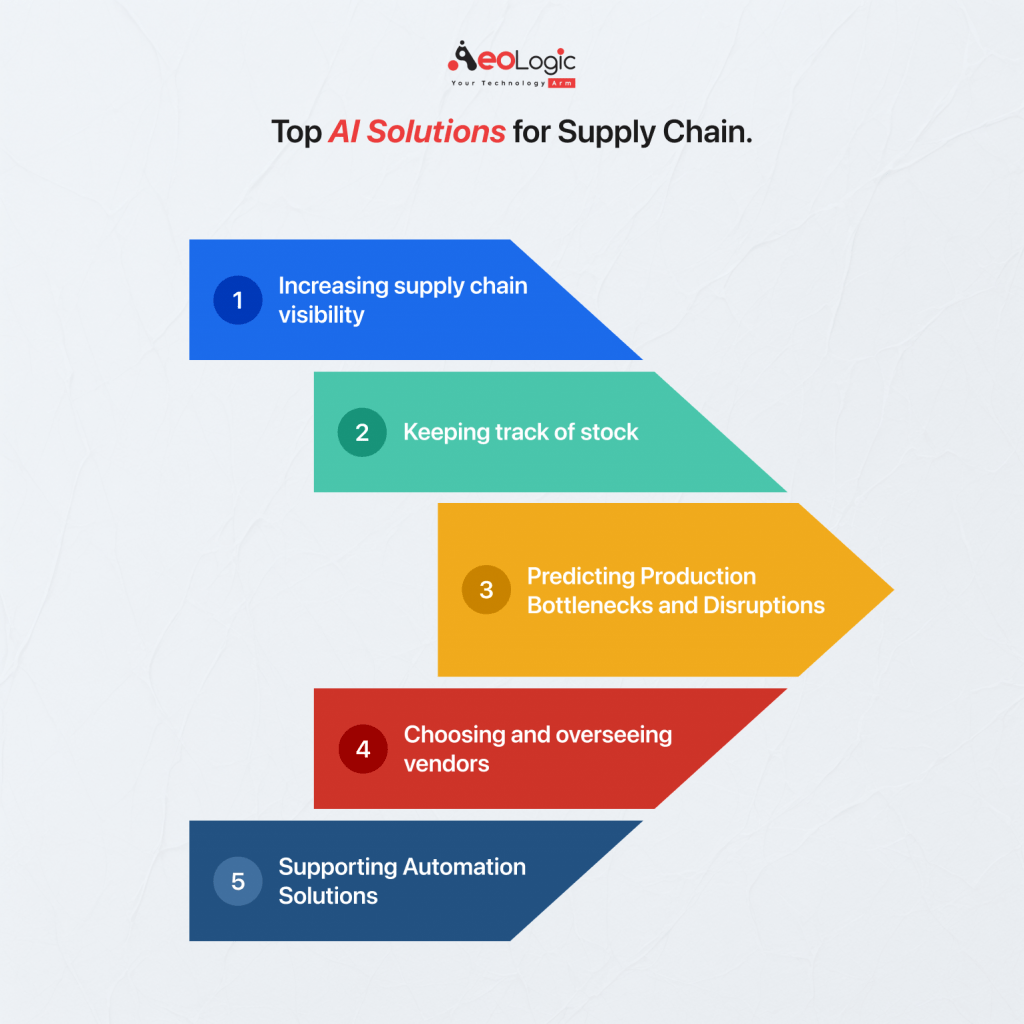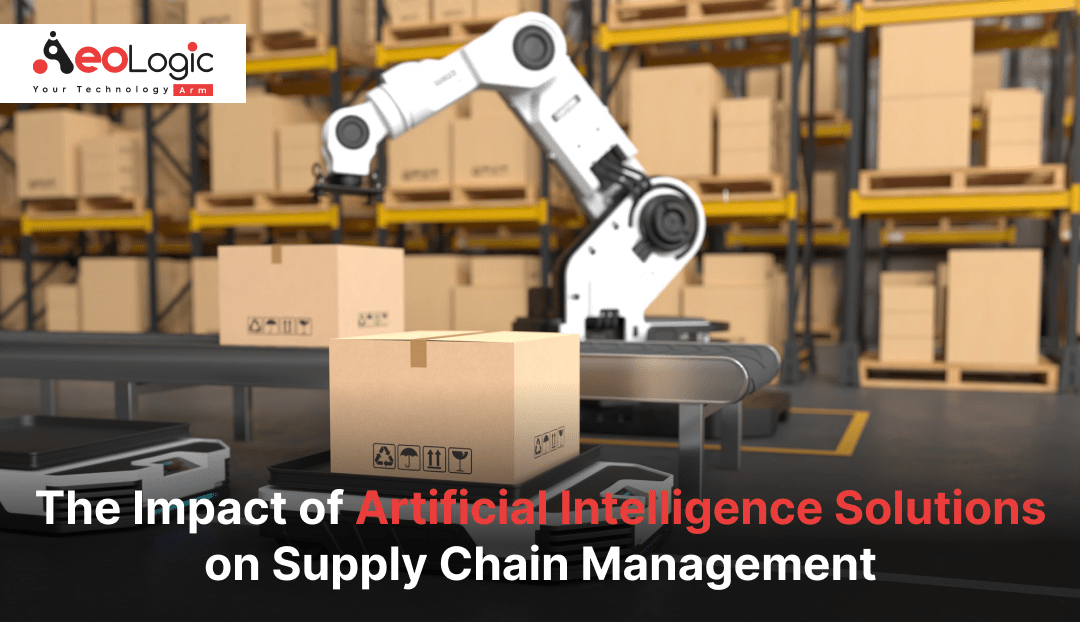The adoption of Artificial intelligence is increasing day by day in different industries. AI is one of the most trending and advanced technologies that make various aspects of an industry better with its advanced algorithms and capabilities. If any element inside the different sectors gets affected by the AI-based solutions then that is the supply chain management aspects. Supply chain management (SCM) is being profoundly changed by artificial intelligence (AI), which is improving several parts of the process, including visibility, efficiency, and decision-making.
AI solutions are evolving supply chain management in a better way and every industry wants to implement this technology in their system. Here are a few stats mentioned below that can give you a clearer idea about AI solutions for supply chain management.
- 90% of supply chain professionals say that AI has the potential to significantly enhance supply chain efficiency. AI-powered predictive analytics can reduce inventory holdings by up to 20%.
- AI can increase supply chain transparency by up to 50%.
- 78% of supply chain professionals believe that AI can enhance supply chain visibility.
- AI can optimize warehouse operations and labor utilization by up to 40%.
- 60% of companies are planning to increase their investments in AI for supply chain optimization.
Hope these above-mentioned stats will give you a little bit more clear idea of the importance or impact of AI solutions for supply chain management.
Overview
AI-based solutions can streamline transportation and logistics by analyzing data-driven decision-making and offering effective scheduling and routing. Reducing resource waste increases sustainability efforts and improves the client experience through individualized services. Businesses can have greater visibility and risk resilience by combining artificial intelligence (AI) with Internet of Things solutions. This allows them to achieve a competitive edge in a market that is constantly changing. There are many other things that we will make you more informed about in the upcoming paragraph.
In this article, we will discuss the impact of AI solutions on supply chain management. We will also see some interesting additional details like benefits and some real-world AI solutions examples, and in the end, we will make a conclusion on the whole discussion.
What AI Solutions refer to Supply Chain Management?
If we only talk about simple AI solutions then Artificial intelligence solutions are cutting-edge technologies that automate tasks, make predictions, and learn from data without the need for explicit programming. They do this by utilizing algorithms, data analysis, and processing power.
Through a variety of methods, such as information capture, risk management, inventory optimization, supplier selection, and supplier relationship management, AI technologies can aid in the optimization of supply chain management. There are a lot of solutions and trends in AI that can together improve agility, efficiency, and resilience in supply chain management.
Top AI Solutions for Supply Chain

Large volumes of supply chain data can be ingested by AI-enabled solutions, which can also identify patterns and produce advice that sounds human. Additionally, they can pick up skills on the job by integrating with other technologies and gradually honing them.
Here is a snapshot of how AI is currently being developed in supply chains:
1. Increasing supply chain visibility
AI can use Internet-of-Things (IoT) sensor data to gain visibility into supply chains. For example, Roambee’s AI-powered platform integrates real-time IoT sensor data with data streams from carriers, ports, airport operations, rail lines, traffic reports, and weather forecasts.
The platform then uses this data to generate predictive and contextual business signals, insights, and forecasts, such as replenishment triggers and quality compliance projections.
Related blog: Role And Benefits Of IoT In Supply Chain Management
2. Keeping track of stock
AI’s capacity for demand forecasting helps manufacturers and merchants better understand the seasonality of stock-keeping units, which in turn optimises inventory turns and minimises stockouts.
For example, Gaviota, an automated manufacturer of shutters and sun protection, used ToolsGroup’s SO99+ solution to reduce inventory from 61 to 35 days, a 43% drop in stock levels.
In order to meet service level objectives, the manufacturer’s supply chain’s ideal inventory mix was determined via the SO99+ program.
Another AI-powered inventory management tool is Gather AI. Drones are used to fly across warehouses and take pictures of inventory placed in pallet placements.
The AI scans barcodes, language, and other information in the photos and automatically compares it with what’s in the warehouse management system (WMS), providing warehouse managers with real-time inventory data via a dashboard.
Also Read: Why Custom AI Solutions Are the Future of Data Analysis and Reporting
3. Predicting Production Bottlenecks and Disruptions
Artificial intelligence can predict raw material shortages years in advance. “AI can help companies prevent production bottlenecks by monitoring current and future availability levels of raw materials based on news, weather, and other available data,” says Jason Hehman, client partner at TXI, a provider of digitalisation tools.
“For example, suppose there is a historic drought in the Southeast United States. That will not have an influence on timber supply for two or three years, but AI may use rainfall data to predict the pinch,” he adds.
In short, AI-powered technologies can give a road map for navigating uncertainty.
According to Mike Sigler, senior director of customer success at the information technology services consultancy Nexer Group, “the AI can act as a personal copilot and make users more effective in their jobs by flagging product movement trends, creating heatmaps, and monitoring for broader supply chain disruptions.”
4. Choosing and overseeing vendors
AI can expedite the request-for-proposal procedure. With its natural-language interface, Verusen’s Trusted Supply application, for example, enables suppliers to reply quickly to requests for materials made by manufacturers and other businesses, therefore increasing the match rate.
Procureship, an e-procurement platform for purchasers of marine equipment, services, and solutions, is another AI-powered solution. Using a marketplace of service providers and its machine learning algorithm, it makes supplier recommendations to expedite and simplify the purchasing process.
Also Read: Artificial Intelligence Solutions in Different Industries
5. Supporting Automation Solutions
Warehouse operators can boost the effectiveness of picking operations with the use of AI-enabled warehouse robotics technology.
“AI will help make voice picking technology more possible and prevalent. Through a headset microphone, a user can receive quick audio information on inventory levels, supplier limits, and order status,” says Sigler.
For instance, distributors can better serve retail customers by utilising robotic case pick capabilities from Symbotic, a supplier of AI-enabled robotics technology for the supply chain.
Best AI Solutions Examples that can manage the Supply Chain more Efficiently
There are a lot of AI solutions that have been implemented by some well-known companies across the world. Here are a few top real-world examples mentioned below.
- IBM Watson Supply Chain Solutions makes use of artificial intelligence (AI) to deliver real-time insights into supply chain processes, facilitating predictive analytics for risk management and demand forecasting.
- Oracle supply chain management cloud solution uses AI to enhance supply chain operations for businesses by optimizing supplier risk assessment, demand forecasting, and logistics.
- ClearMetal makes use of AI to improve inventory control and demand visibility, delivering insights that improve supply chain decision-making.
- Project 44 offers a visibility platform powered by AI that improves real-time cargo tracking, lowering delays and increasing logistics efficiency.
Also Read: Impact of Artificial Intelligence on the Future of Workforces
Benefits of AI Solutions For Supply Chain Management
There are many benefits of AI solutions for supply chain management as here are a few mentioned below.
#1. Improved demand forecasting
It is important to have calculated ideas or predictions about stocks as when and how much stocks need to be refilled again. But this cannot be possible without any specific tools that cost companies in losing customers. Where, AI increases forecasting accuracy for consumer demand, lowering the possibility of stockouts and surplus inventory.
#2. Better supply chain visibility
If you have visibility of every aspect in the supply chain then it could be helpful to manage it efficiently. But manual ways to visibility cannot access data properly and do not let us have insights that interrupt the decision-making process too. This is where the importance of AI solutions in supply chain management comes in. AI offers real-time insights into supply chain processes, facilitating prompt reaction to interruptions and proactive decision-making.
#3. Enhances customer experiences
Customer experience also matters too much as if a company provides a better customer experience then it helps to regain the customer. But without any advanced tools or techniques, many things can affect order fulfillment speed, accuracy, and support service providing a bad experience to customers. Where with the Artificial intelligence, higher customer satisfaction and loyalty are a direct result of shorter response times and improved order fulfillment accuracy.
#4. Aging and flexibility
To manage the supply chain better, it is important to have ideas about market trends and the potential to adapt to those trends in less time. AI technologies improve overall agility by enabling businesses to quickly adjust to shifting market conditions and client needs. This helps to stay ahead in the competitive world.
#5. Risk mitigation
Every organization wants to take low risk and get high returns in supply chain management. This helps to reduce the chances of loss and also increases efficiency. AI technologies improve overall agility by enabling businesses to quickly adjust to shifting market conditions and client needs.
Related Technology: The Role of RFID Technology In Supply Chain Traceability
Final Words: AI Solutions for Supply Chain
Supply chain management is greatly evolved by AI solutions, which lead to notable gains in responsiveness, accuracy, and efficiency. Organizations can optimize inventory management, streamline logistical operations, and improve demand forecasting by utilizing automation, real-time visibility, and advanced analytics.
As artificial intelligence technologies are moving towards more advancement, supply chains will need to incorporate them more and more. This will help companies survive in a competitive market and advance sustainability goals. Using AI in supply chain management is not only a smart technological move, but it’s also a necessary strategic move for success in the upcoming world.






